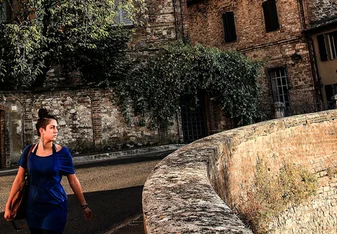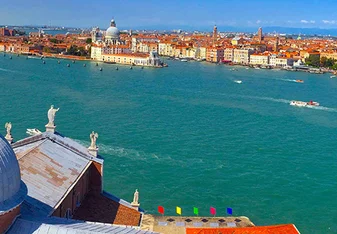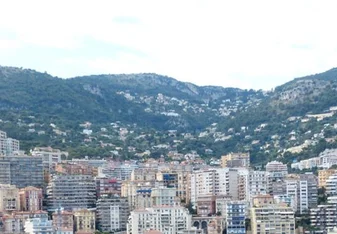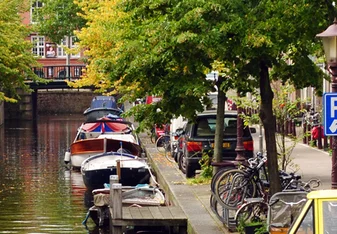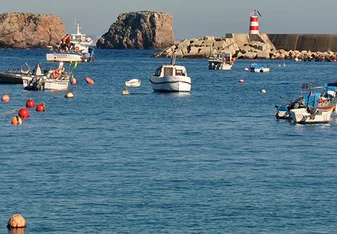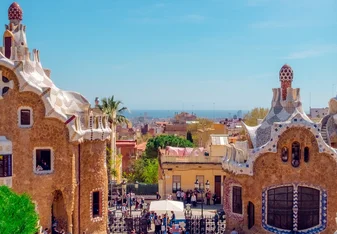Study Abroad Programs in Italy
About Studying in Italy
Other than gracing many a travel magazine cover as the quintessential European getaway, Italy has an abundance of study abroad opportunities for students of all majors. Milan attracts aspiring fashion designers from all over the world, while geology students head over to Sicily to gain field experience collecting data on volcanic activity.
When participants aren’t studying, they’ll be occupied by Italy’s diverse landscape and magnetic culture. From the towering Dolomites to the turquoise Mediterranean Sea, students can explore medieval villages, wander through art museums, and discover the perfect risotto recipe.
No matter where in Italy your studies take you, enriching cultural experiences (and really good pizza) await around every corner.
Where to Go
Rome
When it comes to studying overseas in Italy, Rome is a top contender for many foreign students. From international relations to economics, Italy’s capital possesses a diverse array of industries that cover nearly every major. Plus, when you go through programs that offer classes in Italian, you have the chance to broaden both your language education and your cultural experience.
Florence
History and the arts have a home in Florence. Several universities run liberal arts programs in such subjects as fashion, art and architecture, literature, history, and film. Of course, no lesson in Florence would be complete without taking advantage of the surrounding resources. Studying overseas in this northern city entails some exploration of renowned museums, medieval remains, and more cultural sites.
Milan
While there isn’t a bad place to study fashion in Italy, few opportunities will compare to those available in Milan. With Prada, Versace, and more much-loved brands based in this Italian city, overseas students can learn about the industry from top to bottom. If Milan as a destination is more appealing to you than Milan as Italy’s fashion capital, explore programs in business, music, and an abundance of other industries that thrive in that region.
Planning Your Trip
Choosing your destination is only half the fun of organizing a study overseas experience in Italy. With unique housing opportunities and an exciting student culture, there’s more to know when planning a trip.
How to Choose a Study Abroad Program in Italy
As with any study abroad experience, course types and destination will be the two most significant factors when selecting a program in Italy. While courses in the nation’s urban hubs are likely to offer a variety of subjects, some regions are more built for certain studies than others, like Milan and fashion.
However, don’t get too hung up on staying within the constraints of your major. Studying overseas is about getting a different kind of education, one that instructs on adaptability and embracing other cultures. Taking those Italian courses, even as a non-language major, will enhance your present experience in Italy and be useful for future cross-cultural interactions.
Housing
When it comes to accommodation, students of Italy abroad programs have several options. Most common are shared housing arrangements, with two to four people per room and facilities like kitchens and bathrooms shared across each floor.
In situations like these, your roommates could be from your home country or, depending on how global your chosen program is, other parts of the world. If you’re hoping for a more immersive experience in the local culture while studying abroad, opting for a homestay with an Italian family will provide a more well-rounded experience.
Visas
Where you’re from and how long you’re staying will factor into whether or not you need a visa to study overseas in Italy. For U.S. citizens staying in Italy under 90 days, a likely scenario for summer or short semester programs, a visa is not needed. However, if you’re pursuing a lengthier study abroad program, you’ll need to acquire a student visa.
Your university or organization will likely offer some guidance in this process, but you’ll have to round up the required materials. Not to be forgotten are your passport, bank statements demonstrating sufficient funds to support yourself in-country, and a passport-style photo of you. It’s recommended to begin this process a few months in advance.
Social Life & Student Culture
What does a weekend in Italy look like? It’s not all pasta and wine. Students can expect a vibrant social life influenced by Italian culture. In Rome and other cities, evening activities are abundant, with dinner at around 8:00 pm followed by nighttime staples, such as viewing Trevi Fountain glowing by light.
During the day, you can go monument hopping, gelato in hand, or explore the ancient artifacts of a historical museum. Of course, your adventures will extend beyond your host city as well, with getaways to Venice or the Amalfi Coast being popular choices among study abroad students who are inclined to wander.
Health & Safety
At the moment, the U.S. Department of State advises a little extra caution when traveling in Italy due to increased risk of terrorist activity. Otherwise, the potential threats to student safety aren’t anything out of the ordinary. It’s recommended that all visitors to Italy be up-to-date on their vaccines, and you should be wary of pickpockets and petty theft in crowded areas.
Costs & Funding
While it’s no secret that studying abroad adds a hefty extra expense on top of your regular education costs, carefully managed budgets and scholarship opportunities make programs in Italy more affordable.
Typical Program Cost
Including accommodation, class tuition, and group excursions, study abroad program fees cover a lot of ground. Summer programs in Italy will typically cost in the low thousands, around $2,000 to $4,000, while single-semester study abroad experiences can range from $6,000 to $9,000. For programs lasting a year, expect to pay $10,000 or more in program fees.
Funding Options
Other than asking for more hours at work, there are a few creative ways you can fund your study abroad trip to Italy:
- Fundraising: Your university may have some organized fundraising events for study abroad program participants. From car washes to selling chocolates, take advantage of these pre-planned opportunities.
- Sell stuff you don’t need: Did you play a musical instrument growing up? Do you have a library of books you won’t read again? Do you really need a car if you’re moving overseas? Some of these items may be difficult to say goodbye to, but it’ll be worth it when you’re making new memories in Italy.
- Be more practical with your birthday list: One quick way to make some extra cash is to simply ask for money instead of physical gifts for your birthday or holiday celebrations. Alternatively, you could also ask for more practical gifts, like a suitcase or travel adapter, to knock essential items off your packing list.
Scholarships
Scholarships provide wonderful opportunities for making study abroad a more affordable experience for all students. For programs overseas in Italy, explore the following options:
- SAI Programs: With programs in Rome, Milan, Florence, and more Italian destinations, SAI is a top organization for studying abroad in Italy. Luckily, they come equipped with scholarships for their participants.
- CEA Study Abroad: CEA offers plenty of scholarships to match their abundance of study overseas programs. Scholarships are awarded based on academic merit, financial need, and diversity, opening doors for many deserving students.
- Santa Reparata International School of Art (SRISA): Based in Florence, SRISA offers scholarship opportunities to their international students of design, photography, and more arts studies.












































